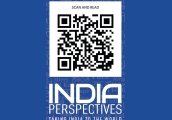Consulate General of India
New York
Sustainability from the Inside Out: Exploring the Link Between Yoga & the Solutions to Climate Change
Seminar to Commemorate the 4th International Day of Yoga
Bhakti Center, New York, June 10, 2018
Remarks of Sandeep Chakravorty, Consul General of India on:
“The Significance of the Culture of Yoga”
It is indeed my honour and privilege to be part of this incredible panel of speakers that the Bhakti Center has put together to commemorate the 4th International Day of Yoga. I thank the Bhakti Center for selecting this most pertinent subject of role of Yoga in combating Climate Change and Environmental Degradation. I thank H.H. Radhanath Swamiji, Gauranga Dasji and Kaustabha Dasji of the Bhakti Center for this initiative. I also thank Dr. Mary Evelyn Tucker & Dr. John Grim of the Yale Divinity School, Dr. David Haberman of Indiana University, Dr. Peter Whitehouse of Case Western University and Ms Anita Katial for being part of this panel.
Climate Change, Sustainability and Sustainable Development have become buzzwords, ringing out in classrooms to boardrooms to summit of world leaders. Many genuinely want to cause the least damage to the environment and try different methods, from recycling to environmental activism. Many think of converting their lifestyles into sustainable ways of living. The question is how to do it. Can technology and investment be the answer? To many being how we are, behave the way we do, and let technology and money clean the dirt, seems to be the answer. Can this really happen without changing our culture? And what is that culture?
The UN World Commission on Environment and Development states: “sustainable development is development that meets the needs of the present without compromising the ability of future generations to meet their own needs.” Sustainability is about being self sufficient – producing as little waste as possible and living a ‘greener life’. The conventional wisdom is that there are three pillars of sustainability which are environmental, social and economic. But where is the pillar for humans? I would say it is the absent 4th pillar that it is the most important pillar because it has to do with Us, you and me, how we are, what we are, our body, our mind and our soul. It is about our self existence and our love for self. Is there a world if we are dead? Or can we live if the world is dead? If we love ourselves, then how can we not love others? And how can we not love Mother Nature? Nature or Divinity resides within us. When we realize this, when we have the strength and courage to make an inward journey then we not only discover ourselves but also realize that we can only prosper spiritually and materially if we are in harmony with others and nature. This is the message of Yoga, message of Yogis and perhaps the only remedy for Climate Change is the Culture of Yoga.
We talk about the Environment and Climate Change by looking at life in bits and pieces. If we look inclusively and inward we will see the connect. Swami Vivekananda said “Nature is homogeneous. Differentiation is in manifestation. The Sanskrit word for nature is Prakriti and means literally differentiation. All is one substance, but it is manifested variously” So the river is a part of us as forest is within us. Then how can we pollute the water that we drink, contaminate the air that we breathe or poison the river that we bathe in and destroy the live giving forest? This disconnect between the human nature, life style and Mother Nature is the root cause of all crises, whether it is Climate Change, or rootlessness, anxiety, depression, suicide, addiction, gun violence, broken relationships or general ennui. It is a continuum. Climate Change and Environment cannot be divorced from our lives. We are what we do, what we think, what we eat and what we drink. The environment is part of us, it is within us, about us and around us. It is one and a whole. We cannot shut the door to the environment. We are experiencing and living it every moment. It is an organic part of how and where we live.
In early times we used to drink from the river or the pond or pluck a fruit from a tree. Today water is conveyed by pipes to the home. So we drink the water unmindful of its origin and therefore have the propensity to abuse it, little realizing that the water is depleting and that the river is being polluted. Many modern children really believe that water is made in the supermarket in bottles. We need to go to Whole Foods to buy genuine food. This disconnect has been created by technology and we are constantly yearning for comfort from material goods little realizing that real and enduring comfort can be found within us, like the serene light of the lamp in the sanctum sanctorum of the temple rather than the blazing neons in a strip mall. Today our water, food and air are contaminated because we sought solace outside rather than within us.
There have been meetings at very high levels for addressing Climate Change. The Paris Agreement has been agreed to by many countries. But does it address this issue? The Agreement’s central aim is to strengthen the global response to the threat of climate change by keeping a global temperature rise this century well below 2 degrees Celsius above pre-industrial levels and to pursue efforts to limit the temperature increase even further to 1.5 degrees Celsius. Additionally, it aims to strengthen the ability of countries to deal with the impacts of climate change. To reach these ambitious goals, appropriate financial flows, a new technology framework and an enhanced capacity building framework will be put in place, thus supporting action by developing countries and the most vulnerable countries, in line with their own national objectives. It implores nations to invest in technology to arrest carbon emission, alternative fuels, emissions trading. But it doesn’t mention the principal and central actor i.e. we humans. Countries don’t pollute. Humans do. There isn’t a single mention of the human, how he or she behaves and how he or she will contribute to arresting climate change. The Paris Agreement mentions Internationally Determined Actions and Nationally Determined Actions but what about Individually Determined Actions?
In fact, does any international communique talk of the human being, how he must change, how he must be austere, frugal and only consume what he needs? Does anyone talk of changing the march of consumerism, of reducing demand? Is anyone conscious that most things made in the world today are meant to be thrown, many without being used even once such as food. No, because that will be contra-economic theory. It will contra-growth and contra-market economy. Austerity and frugality are bad words in the market economy. They are antediluvian.
Mahatma Gandhi said there is enough in this world for everyone’s need but not enough for even one’s greed. This is the central yogic message. “Yoga is about self-awareness, conscious decisions and actions. Consciousness distinguishes Asanas from exercise. Being reflective. Not being impulsive. Think before you act. Sustainable living is to be practiced first at the level of the individual, then society, and then globally. But where will this motivation for acting individually come from? It won’t come from the Paris Agreement or fat tomes of scientists. You can be a believer of Climate Change not by clinical and scientific evidence but by looking inside you. The answer is simply within. “Along with oversight what we require foremost is insight, into ourselves and our real self-interest as conscious living beings” As the wisdom of the Gita tell us “If we want a world where the damage does not recur, we cannot ignore the question of consciousness: who we are beyond the urges that compel us to greed and exploitation. Without that knowledge of our deeper self, people will simply find new ways to do an end-run around environmental controls.”
Environmental control seldom works. Self-control almost always works. If we decide to live in harmony with nature from within, we don’t need any Accord, Agreement, Investment or Fines. We will do it as habit, as our nature. “Yoga teaches us a holistic vision of the world, blurring the boundaries between ourselves and other life forms, cultivating attitudes and igniting actions with the potential to more intimately connect us with the earth’s changing climate’’ says Deborah Phelan, and how true her words are. “Many aspects of yoga are in fact about being in the moment and at one with nature or the universe,” says Jane Jarecki. “Imagine the possibilities if most of the one billion people in the developed world, where consumption is most rampant, were acting through emotional regulation and self-mastery most of the time, with each striving to be mindful of future generations. Humanity would make great strides toward leaving the smallest possible carbon footprint arising from a palpable awareness of interconnectedness.’’ Inspiration for climate action has to come from within. Every action we perform is a contribution to some aspect of the world. Just being conscious of that will keep us inspired. And inspired souls are those who change the world.
The operative word is inner. If we are convinced in our innermost selves that we have to change the abuse of the environment, we will do so. It comes naturally. If you are convinced that from your inner calling that vegetarianism is good for yourself and for the world, it won’t take a second to stop eating meat. If you are convinced from within that plastics in the oceans are destroying all marine life, it doesn’t take a second to stop using plastics. We don’t really need a straw to sip our coffee or drink.
All behavioural changes will come when we have the strength to make the journey within and this is the essence of Yoga. Srila Prabhupada said “…..a great soul in Krishna Consciousness becomes humbler than the grass and bowed down like the fruitful trees because a Krishna Conscious person acts as the agent of Krishna, therefore he discharges his duty with great responsibility.” So if one is Krishna Conscious or attains high level of Consciousness can he or she inflict pain on Mother Nature? The answer is an emphatic No. The life of the Yogis is replete with messages of austerity and simplicity. Paramahansa Yogananda said “It is not your passing thoughts or brilliant ideas so much as your plain everyday habits that control your life....Live simply. Don’t get caught in the machine of the world— it is too exacting. By the time you get what you are seeking your nerves are gone, the heart is damaged, and the bones are aching. Resolve to develop your spiritual powers more earnestly from now on. Learn the art of right living. If you have joy you have everything, so learn to be glad and contented....Have happiness now.” And what can be greater joy than living in the lap of Mother Nature in total harmony? And how will we attain this without engendering a Culture of Yoga among all of us?
***********


















































.jpg)




















